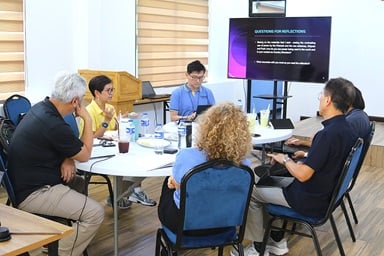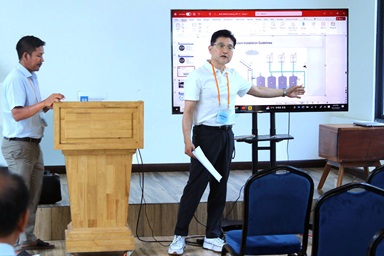The Philippines United Methodist Church lit candles on World AIDS Day to signify an outcry and commitment to end the stigma on HIV and AIDS.
Bishop Pedro M. Torio Jr. of the Baguio Episcopal area was among those who led the prayers during the candle lighting ceremony. It was the culmination of the two-fold forum held for clergy, laity members, seminarians and student leaders on Dec. 1.
"May this moment of candle-lighting signify the beginning of our conscious efforts to end the stigma attached to HIV and AIDS, and may this signify the beginning of creating and building a caring and redeeming community," Torio prayed.
The forum, entitled “Critical Thinkers: Steadfast in Pursuing Shalom,” was supported by the Center for the Church and Global AIDS through its executive director, the Rev. Donald E. Messer, and the Office of Christian Unity and Interreligious Relationships. The two forums, attended by 130 clergy and lay members and 120 student leaders, were held Oct. 2 and Dec. 1. The forums were organized by the John Wesley Academy, a program of the Middle Philippines Conference in partnership with Wesleyan University-Philippines.
Darlene Marquez-Caramanzana, a United Methodist deaconess and vice chair of the International HIV and AIDS Reference Group of the World Council of Churches, said that the rate of the spread of HIV is fast in the Philippines.
"We will lose our young people," she said. "The pandemic continues to be one of the most serious health concerns in the world. The church is not a church if it doesn't fulfill its ministry to stop the undue stigma, discrimination and condemnation.”
"What is very impressive to me is that all three resident bishops are keenly committed to Christian Unity and Interreligious Relationships and on global health,” Messer said. “In the Filipino context, global health currently focuses heavily on HIV and AIDS because the rate of HIV and AIDS is increasing dramatically.
"When I was there three years ago, I wrote an article saying it was escalating — there were then 10 cases a day. Now there are 25 cases a day being reported. It is one of only seven countries in the world where it is increasing."
‘Health care is a basic human right’
Manila Area Bishop Rodolfo Juan was the keynote speaker. He said health is a "part of the tradition of John Wesley, who wrote a little guide [Primitive Physick] for ordinary tips for health or simple cures."
It falls within "life experiences to note how many illnesses can be prevented if we have proper lifestyles," Juan said.
"What would it look like to embrace the whole vision of wellness globally? Health care is a basic human right. Let us see the big picture. Let us be focused in battling this malady."
Dr. Nezer A. Soriano, a United Methodist pastor and a physician who is widely involved in promoting HIV/AIDS awareness, participated in a panel discussion on prevention and said there were 25 cases per day in June 2015 — just over one new HIV case an hour.
"Less than 1 percent have been tested [for HIV/AIDS] among Filipinos," Soriano said.
The panel speakers emphasized taking all available measures to prevent new infections or transmissions.
Marquez-Caramanzana noted that most HIV cases are asymptomatic, revealing no physical indications of being ill until full-blown AIDS has set in. She pointed out that the 15-34 age bracket had the largest number of HIV/AIDS cases, and lamented that of more than 25,684 identified HIV cases, just 30 percent receive retroviral drug treatment.
Messer pointed out that other diseases like diabetes and high blood pressure have no cure, but maintenance drugs are available to prevent their progress or control their harmful symptoms. He mentioned there are now drugs that even prevent mothers from passing on the disease to their children at pregnancy and at birth.
Soriano urged churches to host free, voluntary HIV testing by partnering with social clinic service providers and pushing advocacy and awareness to form HIV-competent churches, church members, workers and leaders.
Afterward, seminary student Emilie Gay Ancheta said, “The knowledge I have gained has challenged me into action — to be more open-minded and critical, to get rid of the tunnel vision, just focusing on the spiritual aspect or well-being, but to be more realistic as I consider gender, sexuality, HIV and AIDS issues.
“A concrete act I have committed to do is to submit myself to voluntary HIV testing."
Mangiduyos is a correspondent for United Methodist News Service. Canlas is a writer in the Philippines. News media contact: Vicki Brown, news editor, [email protected] or 615-742-5470.
Like what you're reading? Support the ministry of UM News! Your support ensures the latest denominational news, dynamic stories and informative articles will continue to connect our global community. Make a tax-deductible donation at ResourceUMC.org/GiveUMCom.





